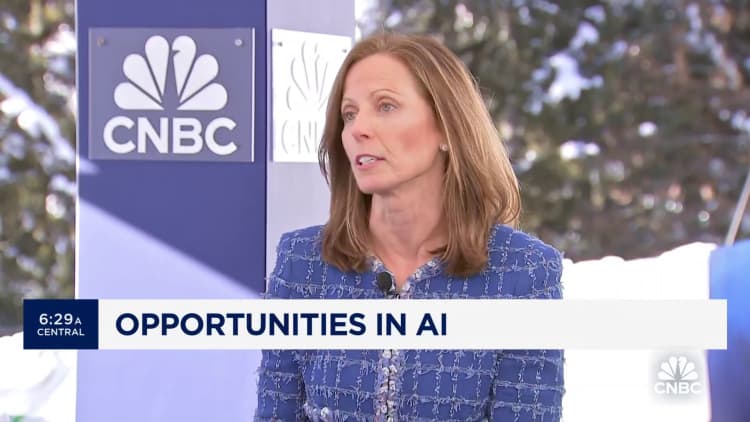Sam Altman, chief executive officer of OpenAI, at the Hope Global Forums annual meeting in Atlanta, Georgia, US, on Monday, Dec. 11, 2023.
Dustin Chambers | Bloomberg | Getty Images
DAVOS, Switzerland — The rise of generative artificial intelligence has dominated private and public discussion at the World Economic Forum as the world’s largest technology companies, including Salesforce, Microsoft and Google, temporarily take over local storefronts as a show of force to conference attendees.
While 2023 highlighted the technology’s ability, 2024 will be about increasing the accuracy of results so that executives in high-stakes industries such as hospitals and manufacturing can get comfortable using AI, said Intel Chief Executive Officer Pat Gelsinger in a CNBC interview.
“You’ve now reached the end of today’s AI utility,” Gelsinger said. “This next phase of AI, I believe, will be about building formal correctness into the underlying models.”
Whether it’s doctors relying on artificial general intelligence (AGI) for diagnoses, warehouses using it to check for assembly line malfunctions, or automated driving, humans need to get more comfortable with the accuracy of the technology, Gelsinger said.
“Certain problems are well solved today in AI, but there’s lots of problems that aren’t,” Gelsinger said. “Basic prediction, detection, visual language, those are solved problems right now. There’s a whole lot of other problems that aren’t solved. How do you prove that a large language model is actually right? There’s a lot of errors today. So you still need you know, essentially, I’m improving the productivity of a knowledge worker. But at the end of the day, I need the knowledge worker to say is it right.”
Pat Gelsinger, CEO Intel, speaking on CNBC’s Squawk Box at the WEF Annual Meeting in Davos, Switzerland on Jan. 16th, 2024.
Adam Galici | CNBC
The best way to improve accuracy is through experimentation and co-piloting tests to advance adoption, said Clara Shih, CEO of Salesforce AI. The AI can adjust to different standard deviation confidence levels as users get comfortable that the technology can be trusted in high-stakes scenarios, Shih said in an interview.
Three phases of AGI will guide adoption, Shih said. Phase one is actively using the technology as an assist for work. Phase two is consciously watching the technology in its autopilot mode to ensure accuracy. The final phase is letting go and trusting the technology will work to the confidence level of one’s choice, Shih said.
“You can tell the AI to be conservative for higher stakes until a human co-pilot essentially graduates it to autopilot,” Shih explained.
The three-phase approach, which heavily draws upon human acceptance of the reliability of the technology, should make AGI less scary than some have speculated, said Open AI CEO Sam Altman during a panel discussion Tuesday with Bloomberg’s Brad Stone.
“This is much more of a tool than I expected,” Altman said. “It’ll get better, but it’s not yet replacing jobs. It is this incredible tool for productivity. This is a tool that magnifies what humans do, lets people do their jobs better, and lets the AI do parts of jobs.”
The past year has been “a year of discovery,” said Nasdaq CEO Adena Friedman in an interview. The financial industry, including Nasdaq, will use AI to update old code to modernize aging systems, improving automated workflows which can save employees hours each day, Friedman said.
“It came onto the scene a little over a year ago,” Friedman said. “We did some experimentation. We started to kind of understand the potential of it. This year will be the year of activations for us and for everyone.”
WATCH: Nasdaq CEO Adena Friedman discusses economy, opportunities in AI at Davos


